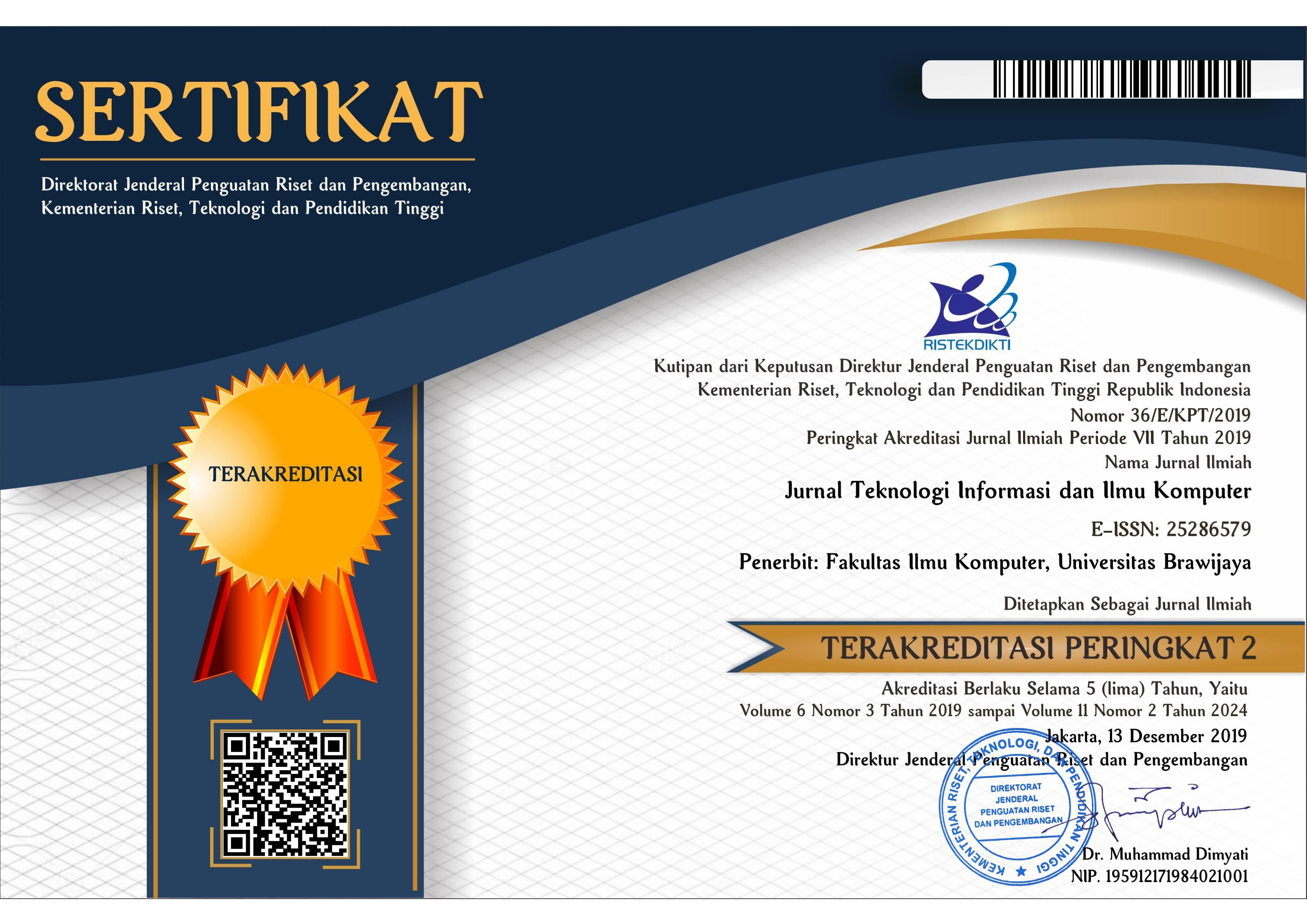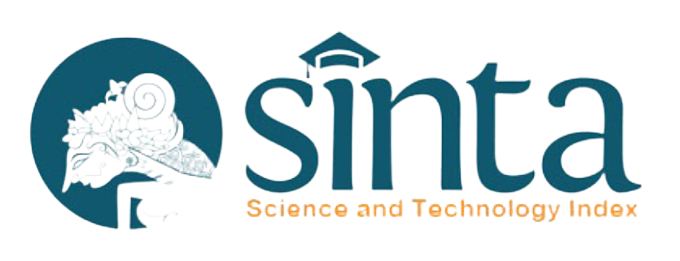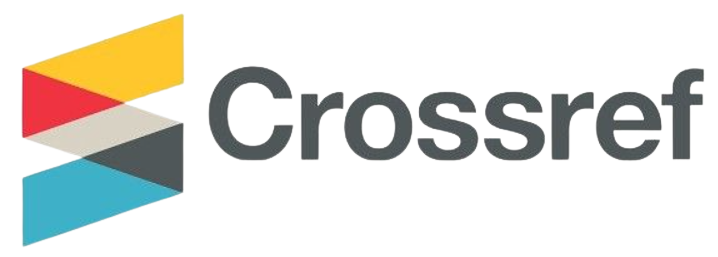Smart Contract Penyimpanan Data Genetika Manusia Berbiaya Murah pada Blockchain Ethereum
DOI:
https://doi.org/10.25126/jtiik.1137558Abstrak
Genetika manusia merujuk pada informasi yang dikumpulkan tentang genom atau warisan genetik individu manusia. Data ini mencakup sekuens DNA, variasi genetik, mutasi, dan informasi lain yang terkait dengan sifat dan karakteristik genetik individu manusia. Data genetika manusia diperoleh melalui serangkaian proses, meliputi penguntaian genetik, pengujian genetik, analisis DNA, dan pemetaan genetik. Data genetika terutama pada manusia merupakan data yang bersifat privat yang harus dilindungi keamanan dan kerahasiaanya. Beberapa penelitian telah menggunakan teknologi Blockchain untuk menyimpan data yang memerlukan keamanan ekstra. Blockchain memberikan solusi untuk perlindungan dan pengelolaan data dengan fitur teknologinya yang terdesentralisasi, terenkripsi, setiap transaksi bisa ditelusuri, dan antitampering atau sulit dimodifikasi. Penelitian menerapkan teknologi Blockchain untuk menyimpan dan mengelola data genetik. Sebagai bahan penelitian data genetika manusia diakusisi dari NCBI repository. Data genetik tersebut disimpan dalam Smart contract pada blockchain Ethereum yang ditulis menggunakan bahasa pemrograman Solidity. Setiap transaksi dan penyimpanan data pada Ethereum dibebankan biaya yang cukup mahal atau yang dikenal dengan biaya gas maka penelitian ini menawarkan solusi hanya menyimpan signature saja dari data genetik itu dalam blockchain. Data genetik yang riil dan berukuran besar disimpan dalam InterPlanetary File System (IPFS). Hasil pengujian menjalankan smart contract pada blockchain Ethereum yang hanya menyimpan signature data genetik ini menunjukkan biaya gas yang sangat efisien karena hanya menyimpan 256 bit saja dari data genetik riilnya yang dapat mencapai giga byte.
Abstract
Human genetics refers to information gathered about the genome or genetic heritage of human individuals. This data includes DNA sequences, genetic variations, mutations, and other information related to individual human genetic traits and characteristics. Human genetic data is obtained through a series of processes, including genetic sequencing, genetic testing, DNA analysis, and genetic mapping. Genetic data, especially in humans, is private data that must be protected by security and confidentiality. Several studies have used Blockchain technology to store data that requires extra security. Blockchain provides solutions for data protection and management with its technological features that are decentralized, encrypted, every transaction can be traced, and anti-tampering or difficult to modify. Research uses Blockchain technology to store and manage genetic data. As research material, human genetic data was acquired from the NCBI repository. The genetic data is stored in Smart contracts on the Ethereum blockchain written using the Solidity programming language. Every transaction and data storage on Ethereum is charged with a fairly expensive fee, known as a gas fee, so this research offers a solution by only storing the signature of the genetic data in the blockchain. The real and large-scale genetic data is stored in the InterPlanetary File System (IPFS). The test results of running a smart contract on the Ethereum blockchain that only stores genetic data signatures show a very efficient gas cost because it only stores 256 bits of real genetic data, which can reach gigabytes.
Downloads
Referensi
AHN, B., 2022. Implementation and Early Adoption of an Ethereum-Based Electronic Voting System for the Prevention of Fraudulent Voting. Sustainability (Switzerland), 14(5), p.2917. https://doi.org/10.3390/su14052917.
ALDYAFLAH, I.M., ZHAO, W., UPADHYAY, H. AND LAGOS, L., 2023. The Design and Implementation of a Secure Datastore Based on Ethereum Smart Contract. Applied Sciences, [online] 13(9), p.5282. https://doi.org/10.3390/app13095282.
ALI, S.I.M., FAROUK, H. AND SHARAF, H., 2022. A blockchain-based models for student information systems. Egyptian Informatics Journal, [online] 23(2), pp.187–196. https://doi.org/10.1016/j.eij.2021.12.002.
DI ANGELO, M. AND SALZER, G., 2021. Identification of token contracts on Ethereum: standard compliance and beyond. International Journal of Data Science and Analytics, 16, pp.333–352. https://doi.org/10.1007/s41060-021-00281-1.
AL AZIZ, M.M., THULASIRAMAN, P. AND MOHAMMED, N., 2022. Parallel and private generalized suffix tree construction and query on genomic data. BMC Genomic Data, 23(1), p.45. https://doi.org/10.1186/s12863-022-01053-x.
BANSAL, V. AND BOUCHER, C., 2019. Sequencing Technologies and Analyses: Where Have We Been and Where Are We Going? iScience, [online] 18, pp.37–41. https://doi.org/10.1016/j.isci.2019.06.035.
BOUBETA-PUIG, J., ROSA-BILBAO, J. AND MENDLING, J., 2021. CEPchain: A graphical model-driven solution for integrating complex event processing and blockchain. Expert Systems with Applications, [online] 184, p.115578. https://doi.org/10.1016/j.eswa.2021.115578.
CHATTERJEE, K., GOHARSHADY, A.K. AND GOHARSHADY, E.K., 2019. The treewidth of smart contracts. In: Proceedings of the 34th ACM/SIGAPP Symposium on Applied Computing. [online] New York, NY, USA: ACM. pp.400–408. https://doi.org/10.1145/3297280.3297322.
DUAN, L., SUN, Y., ZHANG, K. AND DING, Y., 2022. Multiple-Layer Security Threats on the Ethereum Blockchain and Their Countermeasures. Security and Communication Networks, [online] 2022, pp.1–11. https://doi.org/10.1155/2022/5307697.
FAMUJI, T.S., HERMAN, H. AND SUNARDI, S., 2023. PROSES IMPLEMENTASI BIOINFORMATIKA PADA DIGITALISASI DATA GENETIKA MANUSIA. Simetris: Jurnal Teknik Mesin, Elektro dan Ilmu Komputer, [online] 14(1), pp.1–12. https://doi.org/10.24176/simet.v14i1.9064.
FENG, T., YU, X., CHAI, Y. AND LIU, Y., 2019. Smart contract model for complex reality transaction. International Journal of Crowd Science, [online] 3(2), pp.184–197. https://doi.org/10.1108/IJCS-03-2019-0010.
GHOSH, P.K., CHAKRABORTY, A., HASAN, M., RASHID, K. AND SIDDIQUE, A.H., 2023. Blockchain Application in Healthcare Systems: A Review. Systems, [online] 11(1), p.38. https://doi.org/10.3390/systems11010038.
HOEKSTRA, H.E. AND ROBINSON, G.E., 2022. Behavioral genetics and genomics: Mendel’s peas, mice, and bees. Proceedings of the National Academy of Sciences, [online] 119(30). https://doi.org/10.1073/pnas.2122154119.
JIN, X.L., ZHANG, M., ZHOU, Z. AND YU, X., 2019. Application of blockchain platform to manage and secure personal genomic data: A case study of lifecode.AI in China. Journal of Medical Internet Research, 21(9). https://doi.org/10.2196/13587.
KAMAL, Z.A. AND FAREED, R., 2021. Data retrieval based on the smart contract within the blockchain. Periodicals of Engineering and Natural Sciences (PEN), [online] 9(4), p.491. https://doi.org/10.21533/pen.v9i4.2353.
KANNENGIESER, N., LINS, S., SANDER, C., WINTER, K., FREY, H. AND SUNYAEV, A., 2022. Challenges and Common Solutions in Smart Contract Development. IEEE Transactions on Software Engineering, [online] 48(11), pp.4291–4318. https://doi.org/10.1109/TSE.2021.3116808.
KHAN, S.N., LOUKIL, F., GHEDIRA-GUEGAN, C., BENKHELIFA, E. AND BANI-HANI, A., 2021. Blockchain smart contracts: Applications, challenges, and future trends. Peer-to-Peer Networking and Applications, [online] 14(5), pp.2901–2925. https://doi.org/10.1007/s12083-021-01127-0.
KIRLI, D., COURAUD, B., ROBU, V., SALGADO-BRAVO, M., NORBU, S., ANDONI, M., ANTONOPOULOS, I., NEGRETE-PINCETIC, M., FLYNN, D. AND KIPRAKIS, A., 2022. Smart contracts in energy systems: A systematic review of fundamental approaches and implementations. Renewable and Sustainable Energy Reviews, [online] 158, p.112013. https://doi.org/10.1016/j.rser.2021.112013.
KURT PEKER, Y., RODRIGUEZ, X., ERICSSON, J., LEE, S.J. AND PEREZ, A.J., 2020. A Cost Analysis of Internet of Things Sensor Data Storage on Blockchain via Smart Contracts. Electronics, [online] 9(2), p.244. https://doi.org/10.3390/electronics9020244.
LAKKIS, H. AND ISSA, H., 2022. Understanding Blockchain Technology. International Journal of Technology and Human Interaction, [online] 18(1), pp.1–14. https://doi.org/10.4018/IJTHI.297617.
LAURENT, A., BROTCORNE, L. AND FORTZ, B., 2022. Transaction fees optimization in the Ethereum blockchain. Blockchain: Research and Applications, [online] 3(3), p.100074. https://doi.org/10.1016/j.bcra.2022.100074.
LI, H., YANG, Y., HONG, W., HUANG, M., WU, M. AND ZHAO, X., 2020. Applications of genome editing technology in the targeted therapy of human diseases: mechanisms, advances and prospects. Signal Transduction and Targeted Therapy, [online] 5(1), pp.1–23. https://doi.org/10.1038/s41392-019-0089-y.
LIN, H., LI, X., GAO, H., LI, J. AND WANG, Y., 2022a. ISC-MTI: An IPFS and smart contract-based framework for machine learning model training and invocation. Multimedia Tools and Applications, 81(28), pp.40343–40359. https://doi.org/10.1007/s11042-022-13163-w.
LIN, S.-Y., ZHANG, L., LI, J., JI, L. AND SUN, Y., 2022b. A survey of application research based on blockchain smart contract. Wireless Networks, [online] 28(2), pp.635–690. https://doi.org/10.1007/s11276-021-02874-x.
LIU, Y., LU, Y., NAYAK, K., ZHANG, F., ZHANG, L. AND ZHAO, Y., 2022. Empirical Analysis of EIP-1559: Transaction Fees, Waiting Times, and Consensus Security. Proceedings of the ACM Conference on Computer and Communications Security, pp.2099–2113. https://doi.org/10.1145/3548606.3559341.
LOPEZ, D., 2018. Pharmacogenetics: An Important Part of Drug Development with A Focus on Its Application. International Journal of Biomedical Investigation, [online] 1(2), pp.1–16. https://doi.org/10.31531/2581-4745.1000111.
MOHAMMED YAKUBU, A. AND CHEN, Y.P.P., 2022. A blockchain-based application for genomic access and variant discovery using smart contracts and homomorphic encryption. Future Generation Computer Systems, [online] 137, pp.234–247. https://doi.org/10.1016/j.future.2022.07.012.
PACHECO, M., OLIVA, G., RAJBAHADUR, G.K. AND HASSAN, A., 2023. Is My Transaction Done Yet? An Empirical Study of Transaction Processing Times in the Ethereum Blockchain Platform. ACM Transactions on Software Engineering and Methodology, [online] 32(3), pp.1–46. https://doi.org/10.1145/3549542.
PALECHOR, L. AND BEZEMER, C.P., 2022. How are Solidity smart contracts tested in open source projects? An exploratory study. Proceedings - 3rd ACM/IEEE International Conference on Automation of Software Test, AST 2022, pp.165–169. https://doi.org/10.1145/3524481.3527228.
PARK, J.-S., YOUN, T.-Y., KIM, H.-B., RHEE, K.-
H. AND SHIN, S.-U., 2018. Smart Contract-Based Review System for an IoT Data Marketplace. Sensors, [online] 18(10), p.3577. https://doi.org/10.3390/s18103577.
PORSDAM MANN, S., SAVULESCU, J., RAVAUD, P. AND BENCHOUFI, M., 2021. Blockchain, consent and prosent for medical research. Journal of Medical Ethics, [online] 47(4), pp.244–250. https://doi.org/10.1136/medethics-2019-105963.
QIAO, L., DANG, S., SHIHADA, B., ALOUINI, M.S., NOWAK, R. AND LV, Z., 2022. Can blockchain link the future? Digital Communications and Networks, 8(5), pp.687–694. https://doi.org/10.1016/j.dcan.2021.07.004.
QUORA, 2023. Apakah setiap sel di tubuh manusia memiliki DNA? [online] Available at: <https://id.quora.com/Apakah-setiap-sel-di-tubuh-manusia-memiliki-DNA>.
RIADI, I., AHMAD, T., SARNO, R., PURWONO, P. AND MA’ARIF, A., 2020. Developing Data Integrity in an Electronic Health Record System using Blockchain and InterPlanetary File System (Case Study: COVID-19 Data). Emerging Science Journal, 4(Special issue), pp.190–206. https://doi.org/10.28991/esj-2021-SP1-013.
RIADI, I., HERMAN, H. AND IFANI, A.Z., 2021. Optimization of System Authentication Services using Blockchain Technology. Kinetik: Game Technology, Information System, Computer Network, Computing, Electronics, and Control, [online] 6(4), pp.277–286. https://doi.org/10.22219/kinetik.v6i4.1325.
SATO, S., BANNO, R., FURUSE, J., SUENAGA, K. AND IGARASHI, A., 2021. Verification of a Merkle Patricia Tree Library Using F*. [online] Available at: <http://arxiv.org/abs/2106.04826>.
SHARMA, A., AGRAWAL, D., SCHUHKNECHT, F.M. AND DITTRICH, J., 2019. Blurring the lines between blockchains and database systems: The case of hyperledger fabric. Proceedings of the ACM SIGMOD International Conference on Management of Data, pp.105–122. https://doi.org/10.1145/3299869.3319883.
DI SORBO, A., LAUDANNA, S., VACCA, A., VISAGGIO, C.A. AND CANFORA, G., 2022. Profiling gas consumption in solidity smart contracts. Journal of Systems and Software, [online] 186, p.111193. https://doi.org/10.1016/j.jss.2021.111193.
TAHERDOOST, H., 2023. Smart Contracts in Blockchain Technology: A Critical Review. Information, [online] 14(2), p.117. https://doi.org/10.3390/info14020117.
TELSER, A., 2002. Molecular Biology of the Cell, 4th Edition. Shock, https://doi.org/10.1097/00024382-200209000-00015.
TIAN, Z., TIAN, J., WANG, Z., CHEN, Y., XIA, H. AND CHEN, L., 2022. Landscape estimation of solidity version usage on Ethereum via version identification. International Journal of Intelligent Systems, [online] 37(1), pp.450–477. https://doi.org/10.1002/int.22633.
ULLAH, A., SIDDIQUEE, S.M.S., HOSSAIN, M.A. AND RAY, S.K., 2020. An Ethereum Blockchain-Based Prototype for Data Security of Regulated Electricity Market. Inventions, [online] 5(4), p.58. https://doi.org/10.3390/inventions5040058.
WHITMORE, L., MCCAULEY, M., FARRELL, J.A., STAMMNITZ, M.R., KODA, S.A., MASHKOUR, N., SUMMERS, V., OSBORNE, T., WHILDE, J. AND DUFFY, D.J., 2023. Inadvertent human genomic bycatch and intentional capture raise beneficial applications and ethical concerns with environmental DNA. Nature Ecology & Evolution, [online] 7(6), pp.873–888. https://doi.org/10.1038/s41559-023-02056-2.
ZAHED BENISI, N., AMINIAN, M. AND JAVADI, B., 2020. Blockchain-based decentralized storage networks: A survey. Journal of Network and Computer Applications, [online] 162, p.102656. https://doi.org/10.1016/j.jnca.2020.102656.
ZAKRZEWSKI, J., 2018. Towards Verification of Ethereum Smart Contracts: A Formalization of Core of Solidity. [online] pp.229–247. https://doi.org/10.1007/978-3-030-03592-1_13.
ZHOU, J., HU, C., CHI, J., WU, J., SHEN, M.
AND XUAN, Q., 2022. Behavior-Aware Account De-Anonymization on Ethereum Interaction Graph. IEEE Transactions on Information Forensics and Security, 17, pp.3433–3448. https://doi.org/10.1109/TIFS.2022.3208471.
Unduhan
Diterbitkan
Terbitan
Bagian
Lisensi
Hak Cipta (c) 2024 Jurnal Teknologi Informasi dan Ilmu Komputer

Artikel ini berlisensiCreative Commons Attribution-ShareAlike 4.0 International License.

Artikel ini berlisensi Creative Common Attribution-ShareAlike 4.0 International (CC BY-SA 4.0)
Penulis yang menerbitkan di jurnal ini menyetujui ketentuan berikut:
- Penulis menyimpan hak cipta dan memberikan jurnal hak penerbitan pertama naskah secara simultan dengan lisensi di bawah Creative Common Attribution-ShareAlike 4.0 International (CC BY-SA 4.0) yang mengizinkan orang lain untuk berbagi pekerjaan dengan sebuah pernyataan kepenulisan pekerjaan dan penerbitan awal di jurnal ini.
- Penulis bisa memasukkan ke dalam penyusunan kontraktual tambahan terpisah untuk distribusi non ekslusif versi kaya terbitan jurnal (contoh: mempostingnya ke repositori institusional atau menerbitkannya dalam sebuah buku), dengan pengakuan penerbitan awalnya di jurnal ini.
- Penulis diizinkan dan didorong untuk mem-posting karya mereka online (contoh: di repositori institusional atau di website mereka) sebelum dan selama proses penyerahan, karena dapat mengarahkan ke pertukaran produktif, seperti halnya sitiran yang lebih awal dan lebih hebat dari karya yang diterbitkan. (Lihat Efek Akses Terbuka).















